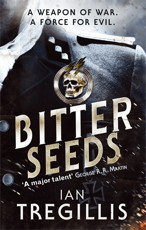Bitter Seeds author interview
Ian Tregillis discusses his debut novel of Nazi super soldiers vs British warlocks

You can read an interview with new US author Ian Tregillis in the latest issue of SFX , on sale now with an incredible look back at Star Trek: The Next Generation . Ian had a lot to say about the first in his alternative-history trilogy, Bitter Seeds (part one of the Milkweed Triptych), so today we'd like to share the rest of that interview online.
Tregillis is an American astrophysicist and author. His Milkweed Triptych, an alternate history about super-Nazis and black magic, has been described as " Inglorious Bastards meets X-Men ". Sound like an odd mash-up of geek tropes? Bear in mind that since he first appeared on the scene in the US, Tregillis has been garnering rave endorsements from big names such as George RR Martin (who calls Tregillis "a major talent") and Cory Doctorow (who describes Tregillis as "one of the most exciting new writers in the field today"). Tregillis is also part of the star-studded writing group, Critical Mass, along with such authors as George RR Martin.
We asked him a few questions about the alternative world he's created and how he researched and planned it:
SFX: Imagine you have to write the blurb on the back cover of the book. What would you say?
Ian Tregillis: On the eve of World War II, the Third Reich unveils a cadre of unstoppable superhuman soldiers. In desperation, British Intelligence resorts to black magic. What follows is a tale of tragedy and triumph featuring superheroes, spies, invisible assassins, warlocks, snipers, and demons - both human and supernatural.
SFX: This is your first novel published in the UK. How long have you been working towards being a published author?
Tregillis: I suppose most writers say this, but the honest truth is that I've dreamed about being a published author since childhood. But actually working toward it? A little less than that. I started writing seriously in 2003, after I finished graduate school. With hindsight, that was a mistake. I shouldn't have waited so long to get started. But it wasn't until then that I realized writing is something for which you have to make the time, rather than waiting for the time to present itself.
SFX: What first inspired you with the idea for Bitter Seeds ?
Tregillis: It came about from a collision of two unrelated ideas. The first was an utterly bizarre piece of World War II trivia, and the second was the Tom Cruise movie Minority Report .
Years before I started writing Bitter Seeds I stumbled across a magazine article about Project Habakkuk , which was a short-lived scheme by the wartime Admiralty to build aircraft carriers from a special form of ice. It wasn't quite as crazy as it sounds - they even got as far as building a working scale model on a Canadian lake. Still, in the end it wasn't feasible, so it was scrapped. But I couldn't shake that image from my head, of vast bergships plying the North Atlantic. I wondered what might have happened if Habakkuk had been successful enough to turn the tide in the Battle of the Atlantic! The answer hit me like a thunderbolt (I still remember exactly where I was at that moment): obviously, Ian, the Third Reich would have sent a pyrokinetic spy to sabotage the icy shipyards. From there it was a short jump to wondering about the programme that created him.
Get sneak previews, exclusive competitions and details of special events each month!
As for Tom Cruise... There's a scene in that movie (minor spoilers here) where the hero is on the run, but he happens to have a clairvoyant at his side. It leads to a fun but short sequence in the movie where she tells him exactly what to do to elude capture - because, of course, she's anticipating everything before it happens. Fun stuff!
But the more I thought about it later, the more it bothered me. Because a truly talented precog wouldn't be working 30 seconds ahead of everybody else. She'd be 30 years ahead of everybody else...
And then, just for fun, I decided to make her a sociopath, too.
SFX: How do you go about building an alternative history of World War II? Did you consciously avoid other people's visions like the Hellboy backstory or Captain America or Philip K Dick's The Man In The High Castle ?
Tregillis: Oh, very much! I had read The Man In The High Castle on a trip to South Korea years ago, but I made a point of not revisiting it while writing this trilogy. (Which is ironic, given that the film adaptation of PKD's story The Minority Report was an important influence.) I still haven't read the Hellboy comics - though I'm sure to devour them, they went on the back burner while I was writing this trilogy. So too did the Laundry novels by Charles Stross, Tim Powers's Declare , some Dennis Wheatley books, and still others.
I like to let ideas rattle around in my head until random collisions cause unrelated things to stick together in intriguing ways. So I started with the bones of the world and the characters in it, and then I started looking for ways to connect them to history. Though I'm quite interested in World War II history, and have been since before I started this project, I would never hold myself up as an expert or amateur historian. So I filled a bookshelf with reference books and got to work.
But once I knew the shape of the story, I knew that the turning point for the war in Bitter Seeds had to be a historical event that was iconic, early in the war, as close to Britain as possible, and surrounded by strange or controversial events. It was easy to find.
SFX: How did you go about researching the minutiae of life in wartime Europe? And was that especially difficult since you're based in the US?
Tregillis: It was by far the most difficult part of the research. Names, dates, and battles are easy - that's what history books are for. But how did people talk to one another, and curse, and kiss, and what did they eat for breakfast? That's trickier. If the past is a different country, then I was trying to write about people who were doubly foreign to me, by virtue of time and geography. In the end, I'd never claim I got it right, but I did my best.
For flavour, I tried to read books written during the war by people who lived through it (Waugh, for instance). One invaluable reference work was How We Lived Then by Norman Longmate. I also made heavy use of the BBC People's War archive. The books are there, it's just that digging out a specific detail isn't as straightforward as looking up a date. Along the way I also became a fan of Foyle's War - I used that show as a source of pointers for focusing my research.

SFX: How do you plan to follow up Bitter Seeds ?
Tregillis: The second and third books in this trilogy ( The Coldest War and Necessary Evil , respectively) are finished. As suggested by the title, the sequel to Bitter Seeds takes place during the Cold War.
And I recently sold a new novel to Tor in the US. Something More Than Night is a Raymond Chandler-inspired murder mystery set in Heaven. Sort of a noir detective story but populated by angels, archangels, cherubim, seraphim, and the rest of the heavenly choir.
Now I'm having a blast brainstorming ideas for the next project.
SFX: Thanks Ian!
Bitter Seeds was released in the US some time ago but hits the UK on Thursday 12 July . The sequels, The Coldest War and Necessary Evil , will arrive in America this summer and in the UK later on. Check out Ian Tregillis's personal webpage here and the Orbit page here . SFX 223 is on sale from Wednesday 30 May to Wednesday 27 June and you can order it here : it features additional author Q&A.


